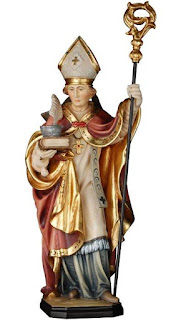Leander (shown), the eldest, became a Benedictine monk about 576, and a few years later was appointed Bishop of Seville. The co-ruler of the Visigoths in Spain, Liuvigild, had arranged for his son Hermenegild to marry the 12-year-old Ingund, sister of the Merovingian Childebert II, who became King of Austrasia. While Ingund traveled through Gaul to Iberia, she met a Catholic bishop who warned her not to accept Arianism, the heresy still practiced by many Visigoths, such as her new husband and his family. Hermenegild's mother, Queen Goiswintha, tried to baptize Ingund into Arianism, but the girl refused. Gregory of Tours tells us what Goiswintha did next:
the Queen lost her temper completely ... seized the girl by her hair and threw her to the ground: then she kicked her until she was covered with blood, had her stripped naked and ordered her to be thrown into the baptismal pool.
Liuvigild sent the two to rule in Seville and get them away from his wife. In Seville, however, Ingund encountered Leander. Leander, like his parents and his siblings, was a powerful voice against Arianism. Seville had a strong catholic population. No doubt from the influence of his wife (no doubt "transitively" from Leander, although from 580-582 Leander was traveling to Constantinople and back), Hermenegild converted to Catholicism in 582.
Hermenegild's father was not pleased: he saw Catholicism as "Roman" and Arianism as part of the Visigothic identity. Liuvigild besieged Seville, capturing it in 584, along with his rebellious and (to Liuvigild) heretical son. Leander fled eastward to Constantinople. Hermenegild was imprisoned and urged to renounce Catholicism, which he steadfastly would not do, refusing the Eucharist from an Arian bishop at Easter. His father had him beheaded on 13 April, 585, making Hermenegild a martyr in the Catholic Church.
Depending on the chronicle, Ingund had one of two different fates. One story from Gregory of Tours is that she fled to Constantinople with their son, Athanagild. She did not survive—at this time, plague was going around the Mediterranean—and was buried in Carthage, but Athanagild was delivered to Constantinople where he was raised by Emperor Maurice II. The other version is that she returned to her family in Gaul where Athanagild was raised by her and her mother, Brunhilda.
Leander remained in the East, preaching and writing against Arianism. After the death of Liuvigild in 589, Leander returned to Seville, where he remained bishop until his death in 600 or 601. In 589 he held the Third Council of Toledo, in which Visigothic Spain (or at least its representatives at the Council) renounced Arianism for good.
His younger brother Isidore said of him "This man of suave eloquence and eminent talent shone as brightly by his virtues as by his doctrine. By his faith and zeal the Gothic people have been converted from Arianism to the Catholic faith."
Two of his writings survive: one is an essay about his triumph of the church on the conversion of the Goths. The other is a monastic rule composed for his sister, Florentina, whom I shall talk about next.
